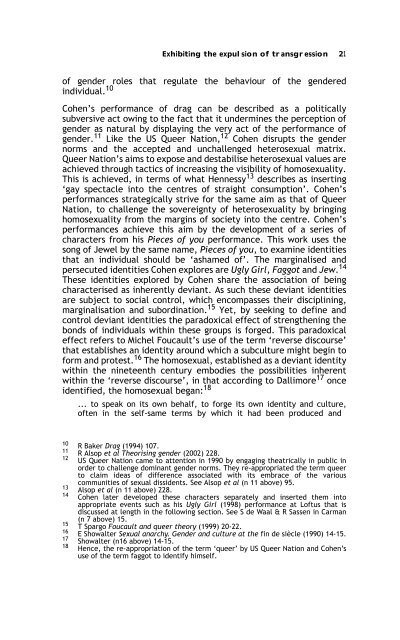Sex, Gender, Becoming - PULP
Sex, Gender, Becoming - PULP
Sex, Gender, Becoming - PULP
Create successful ePaper yourself
Turn your PDF publications into a flip-book with our unique Google optimized e-Paper software.
Exhibiting the expulsion of transgression 21<br />
of gender roles that regulate the behaviour of the gendered<br />
individual. 10<br />
Cohen’s performance of drag can be described as a politically<br />
subversive act owing to the fact that it undermines the perception of<br />
gender as natural by displaying the very act of the performance of<br />
gender. 11 Like the US Queer Nation, 12 Cohen disrupts the gender<br />
norms and the accepted and unchallenged heterosexual matrix.<br />
Queer Nation’s aims to expose and destabilise heterosexual values are<br />
achieved through tactics of increasing the visibility of homosexuality.<br />
This is achieved, in terms of what Hennessy 13 describes as inserting<br />
‘gay spectacle into the centres of straight consumption’. Cohen’s<br />
performances strategically strive for the same aim as that of Queer<br />
Nation, to challenge the sovereignty of heterosexuality by bringing<br />
homosexuality from the margins of society into the centre. Cohen’s<br />
performances achieve this aim by the development of a series of<br />
characters from his Pieces of you performance. This work uses the<br />
song of Jewel by the same name, Pieces of you, to examine identities<br />
that an individual should be ‘ashamed of’. The marginalised and<br />
persecuted identities Cohen explores are Ugly Girl, Faggot and Jew. 14<br />
These identities explored by Cohen share the association of being<br />
characterised as inherently deviant. As such these deviant identities<br />
are subject to social control, which encompasses their disciplining,<br />
marginalisation and subordination. 15 Yet, by seeking to define and<br />
control deviant identities the paradoxical effect of strengthening the<br />
bonds of individuals within these groups is forged. This paradoxical<br />
effect refers to Michel Foucault’s use of the term ‘reverse discourse’<br />
that establishes an identity around which a subculture might begin to<br />
form and protest. 16 The homosexual, established as a deviant identity<br />
within the nineteenth century embodies the possibilities inherent<br />
within the ‘reverse discourse’, in that according to Dallimore 17 once<br />
identified, the homosexual began: 18<br />
... to speak on its own behalf, to forge its own identity and culture,<br />
often in the self-same terms by which it had been produced and<br />
10 R Baker Drag (1994) 107.<br />
11 R Alsop et al Theorising gender (2002) 228.<br />
12<br />
US Queer Nation came to attention in 1990 by engaging theatrically in public in<br />
order to challenge dominant gender norms. They re-appropriated the term queer<br />
to claim ideas of difference associated with its embrace of the various<br />
communities of sexual dissidents. See Alsop et al (n 11 above) 95.<br />
13 Alsop et al (n 11 above) 228.<br />
14 Cohen later developed these characters separately and inserted them into<br />
appropriate events such as his Ugly Girl (1998) performance at Loftus that is<br />
discussed at length in the following section. See S de Waal & R Sassen in Carman<br />
(n 7 above) 15.<br />
15<br />
T Spargo Foucault and queer theory (1999) 20-22.<br />
16 E Showalter <strong>Sex</strong>ual anarchy. <strong>Gender</strong> and culture at the fin de siècle (1990) 14-15.<br />
17 Showalter (n16 above) 14-15.<br />
18<br />
Hence, the re-appropriation of the term ‘queer’ by US Queer Nation and Cohen’s<br />
use of the term faggot to identify himself.
















